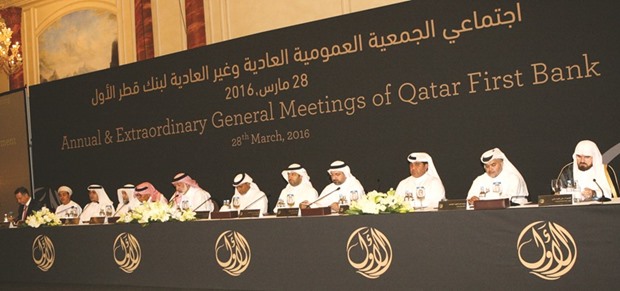Qatar First Bank (QFB), which finds promising potential for private equity in the Gulf region, yesterday said Qatar is one of the best-placed countries in the region to weather the crash of oil prices and the “significant” capital spending on infrastructure, ahead of the FIFA 2022 World Cup, presents it with plenty of opportunities.
The Shariah-principled lender, which is authorised by the Qatar Financial Centre Regulatory Authority, is also planning to expand Islamic financial products to the corporate and private banking market in view of the growing interests in such instruments. “With the hosting of the FIFA World Cup 2022, we expect significant spending on major infrastructure projects including the rail system, new port, highways and stadia, which will no doubt offer a plentitude of growth opportunities to tap into,” QFB chairman Abdullah bin Fahad bin Ghorab al-Marri told shareholders at the annual general assembly meeting, which approved net income of QR66mn in 2015.
Underpinned by the diligent government spending, accelerated efforts for diversification and sound global investments, “Qatar is one of the best placed Gulf Cooperation Council (GCC) countries to weather the crash of global prices,” he said.
QFB, which is expected to be listed on the Qatar Stock Exchange by April end, is keen on strengthening its private equity, which comes under its alternative investments.
Given the current valuations, there is no compelling need to exit and instead it is an ideal time to buy, QFB chief executive Ziad Makkawi said, adding it would be looking at the healthcare sector, which currently constitutes about 38% of its portfolio and also explore options in other sectors such as luxury, food and beverages and equipment services.
QFB – which invested a total of QR33.9mn in 2015, bringing the total capital invested to date to QR1.54bn - recently exited three investments with internal rate of returns ranging from 20% to 50%.
The Shariah-principled lender sold its remaining shares in Al Noor Hospitals, completed the Westbourne House project in London’s W2 district and also sold the plot of land near Burj Khalifa in Dubai.
In new investments, QFB acquired a 15.6% stake in Cambridge’s Medical and Rehabilitation Centre based in Abu Dhabi.
“Our strategy of investing in defensive sectors such as healthcare that are less likely to be affected by tight fiscal budgets and geographies like Turkey, which boasts long-term growth prospects, have helped us cope with the difficult market conditions,” al-Marri said.
QFB would continue adopting an “opportunistic outlook” to source “viable” investment opportunities that surface in such market conditions in order to generate sound returns for the bank and create value for its shareholders, he added.
Highlighting that the alternative investment business continues to perform well and constitutes a major part of its revenues; Makkawi said its prudent investment strategy focused on sectoral and geographic diversification enabled it weather the economic and market volatility.
“The portfolio continued to deliver a solid performance, albeit at a slower pace than in the previous years. Our focus for the portfolio remains to pursue value added initiatives such as streamlining operations, expanding geographical footprints and improving their institutional infrastructure,” he added.

The QFB board addressing the shareholders at the AGM yesterday. QFB, expected to be listed on the Qatar Stock Exchange by April end, is keen on strengthening its private equity business.
